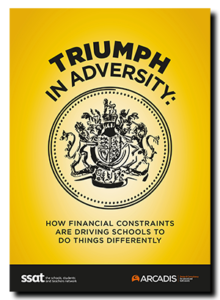 Sue Baldwin, Director, Academies and Maintained Schools, Education Funding Agency, writes…
Sue Baldwin, Director, Academies and Maintained Schools, Education Funding Agency, writes…
The overall funding context
The government is committed to an education system that maximises the potential of every child, acting as a motor for social mobility and social justice. It is investing more than ever before to achieve that – from 2017-18 until the end of the current Spending Review period the core schools budget will be over £40bn per annum.
The government is also firmly committed to introducing fairer funding for schools and high needs. This is an important reform, which will fairly and transparently allocate funding on the basis of schools’ and children’s actual needs, rather than simply on historic levels of funding tied to out-of-date local information. This is a once in a generation opportunity for an historic change that we must get right.
While funding reform provides an essential backdrop to any discussion on school financial management, evidence shows that how schools spend money is as important as the amount of money they receive. Sound financial management, with spending decisions that focus on providing good quality teaching, can make all the difference to children’s outcomes.
In this context, sound financial management is about more than just balancing the books. It’s about having the right frameworks and practices in place, and ensuring that budgets deliver value for money. The rest of this chapter looks at getting the basics right, and maximising the impact of every pound on pupil outcomes to help reach a common goal of maximising the potential of every child.
Getting the basics right
Getting the basics right includes having a thorough understanding of the current funding arrangements, and how your own school’s funding is calculated. Good data and forecasting are key components of that. Robust forecasting of pupil numbers over a 3-5 year horizon is vital, as getting it badly wrong could mean education plans are based on funding that will not materialise. In certain circumstances, overestimation of pupil numbers can lead to significant financial clawbacks, causing financial difficulties. As the school census forms the basis for calculating school allocations, it’s essential to spend time getting the data in the census right.
Robust forecasting of pupil numbers over a 3-5 year horizon is vital, as getting it badly wrong could mean education plans are based on funding that will not materialise
Another fundamental underpinning of sound financial management is having a thorough understanding of the rulebook. Academies benefit from significant degrees of freedom and flexibility. These freedoms include the ability to decide how to spend the funding available to them in the way which has the best impact on their pupils. But that freedom comes with responsibility. The rules dictate not only what schools must do, but what they can do. They provide checks and balances alongside freedoms and, if formulated well, academies’ funding decisions provide a solid framework for making the best use of money.
For academy trusts the financial rules come largely from their status as charitable companies and public sector organisations, where words such as accounts, audits, regularity, propriety and value for money all vie for attention. The Academies Financial Handbook, published by the Education Funding Agency and available here, aims to distil these issues down so that the accountability framework is clear and that trusts are confident about their financial duties and the standards of governance that they should apply. When making decisions, being mindful of the fact you are spending taxpayers’ money is always important and can help make wise decisions. By following the handbook, trusts should find it easier to spend their money wisely and improve outcomes for their pupils.
Our three key messages are to:
Use the freedoms available to you and act within your powers
Read the handbook and ensure that your trust is applying it. Share it with your trustees and make sure that staff with financial responsibilities have a copy. And ensure that your scheme of delegation makes clear to everyone the extent of their individual powers so that spending is properly targeted and controlled.
Maintain oversight
Have some means of monitoring whether the rules are being followed and that your interventions are achieving value for money on an ongoing basis. For example, do you need a separate audit committee? And is your internal auditor, or equivalent, reviewing compliance, and reporting their findings regularly?
Think about standards of conduct and behaviour
Carry out business even-handedly, particularly when dealing with related parties. Be aware of perceptions and ensure your actions are within the rules, transparent and demonstrate benefits for the pupils. Promote transparency – use your annual report, your accounts and your website to do this. And share good practice with other trusts.
Maximising the impact of every pound on pupil outcomes
With the rulebook in hand and the “basics” of sound financial management covered, an integral part of maximising the potential for every child and young person is to ensure that budgets deliver value for money.
The public sector faces a challenge: to deliver world-class services, while spending within its means. In common with other areas of public spending, school budgets will face significant pressures over the Spending Review period. It is therefore more important than ever that schools make sure every pound is spent properly to help improve outcomes for pupils.
We know that very similar schools, with very similar levels of funding, achieve very different outcomes. Good spending decisions that focus on providing good quality teaching can make all the difference to children’s outcomes. We would encourage all schools to undertake internal challenge to see where and how they can go further to improve their efficiency.
In applying educational interventions, school leaders should consider how they can achieve the most impact for the money they spend. To achieve value for money in schools, it’s important to apply interventions which have a sound evidence base: for example, by considering the interventions and approach to evidence contained in the Sutton Trust-EEF Teaching and Learning Toolkit to improve the attainment of disadvantaged pupils.
School efficiency and financial health must start with schools and be led by schools. In a school-led system, schools will work directly with other schools to achieve greater efficiencies, whether through MATs or through individual schools working together to negotiate deals and share services. We would encourage all members of the school business management profession to make the most of local and national professional networks – to share skills, knowledge, expertise and experiences.
To achieve value for money in schools, it’s important to apply interventions which have a sound evidence base: for example, by considering the interventions and approach to evidence contained in the Sutton Trust-EEF Teaching and Learning Toolkit to improve the attainment of disadvantaged pupils
While this must be school led, our job is to help build capacity by providing support and tools. These are for all schools to use, to run efficiently and make the most of the funding they receive. Working with sector organisations, we have published a package of financial health and efficiency tools and guidance.
The package is designed to help support schools to:
- review their level of efficiency
- investigate their levels of spend
- resolve any issues emerging from this assessment.
The collection covers subjects such as budget planning, financial governance and effective procurement. It includes tools to help schools review their financial position and compare their schools’ spend with other similar schools – so they can work together to share the practices that are driving success. It also includes examples of some excellent practice in schools, and a wide range of training and tools offered by organisations in the sector.
We are building a service that will allow you to access professional and expert services that are right for your school. Financial health checks will help schools think about whether accessing external support would be right for them, and what this support might be. If academies get into financial difficulty, we will expect them to access expert services to help them turn around. The efficiency collection on gov.uk carries case studies from school leaders who are considered to be among the best in the country: they are well worth a look.
It is because we know that some of the best existing practice is being demonstrated by schools right now that we continue to work with the sector to further develop tools and guidance.
 This piece is taken from Triumph in adversity – an SSAT and Arcadis publication that explores the many different ways in which schools are overcoming financial constraints. You can download the full publication here [PDF].
This piece is taken from Triumph in adversity – an SSAT and Arcadis publication that explores the many different ways in which schools are overcoming financial constraints. You can download the full publication here [PDF].
